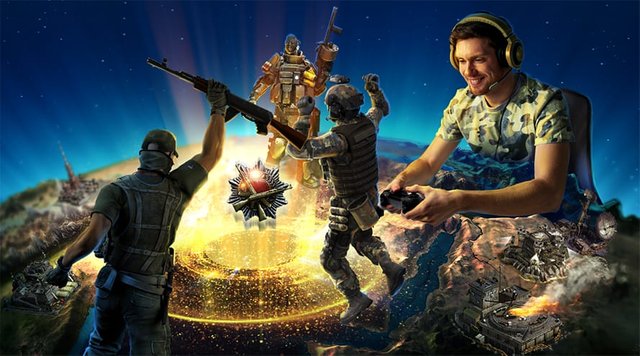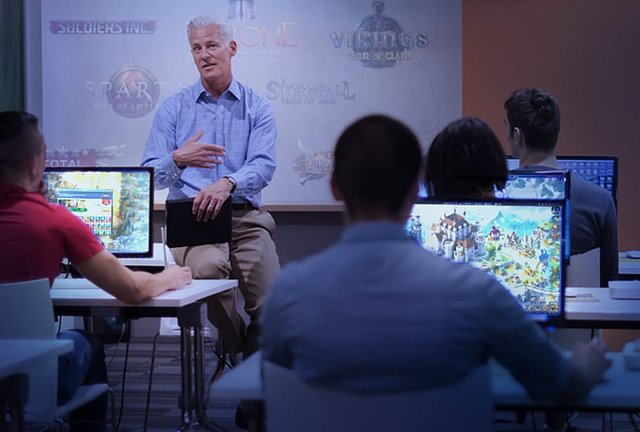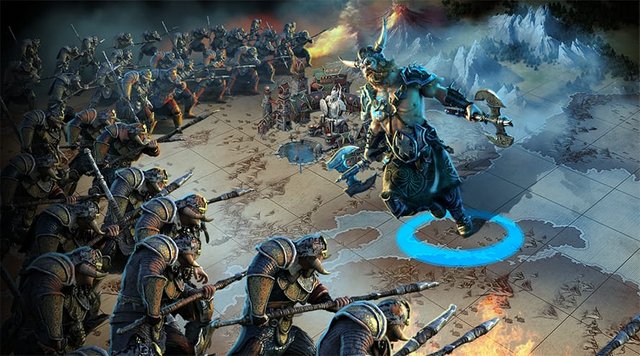How video games help with education?
Humans spend 3 billion hours playing video games…
Per week.
That’s a lot of time. But is that time wasted or is there more to gaming than meets the eye?
I’d argue the latter. The role that games plays in educating is becoming increasingly obvious now that gaming is quickly taking over as the preferred pastime for many people around the world.
But before we talk about education we need to understand the reason behind gaming’s surge in popularity.
Why are video games so popular?
Let’s pull back the curtain on why people like you and I love spending so much time behind a screen… using science.
Video games hit on a lot of our psychological needs. So much so that gamification, the application of game elements, like earning points and achievements, to non-game settings, is now a science with a lot of psychology to back it up.

People are essentially drawn to games for the following reasons:
They give us a clearly defined goal. In the real world the decision to pursue a goal, and deciding which goals to pursue, is left entirely up to us, but in the game world we don’t need to decide - the game tells us which goals to pursue.
They hit on a deep-seated need to feel productive. They make us feel like we’re making progress towards our goals even if these goals exist in a purely digital world.
They shoot bursts of dopamine through our brains by rewarding us with badges, achievements, or new gear every time we achieve a goal.
They typically start off simple and get progressively harder. This makes it easier for us to dive into a state of flow. Flow is when we’re so intensely focused on a task that time seems to melt away.
Some games also have a social aspect, which can draw people in and keep them around to spend time with their new online friends.
The glue that holds all the above things together is the simple fact that gaming is fun. It’s challenging, rewarding, and entertaining all at the same time.
But games are also educational.
Using games to teach kids
As a college grad and passionate gamer, I can tell you something shocking:
School isn’t inherently fun.
I know, Earth-shattering information. But I’m bringing this up because school should be fun. We learn best when we’re fully engaged; when it doesn’t feel like we’re learning, but simply enjoying ourselves. Think about it.
Playing is the natural way children learn. We use song and dance to teach the alphabet, and fun noises to teach kids that the cow says “moo”. We let kids play with arts and crafts to learn colors, basic physics, and to better their hand-eye coordination.
Then, somewhere along the way, education becomes lecturing. You’re talked at for eight hours a day, five days a week, then expected to regurgitate the information on a page. To make matters worse, you’re pressured to get a good grade, and if you don’t you’re forced to stay behind while your friends move on without you.
Can you imagine the effect that must have on a person?
But I digress. We’re not here to talk about faults in the educational system, but about gaming’s role in education.
Gaming - being inherently fun and engaging - has the ability to teach a great deal of skills. Video games have the ability to teach math, English, history, humanities, problem solving, physics… the list goes on.
To help explain my point, here’s a TED talk with Jane McGonigal talking about how gaming can make the world a better place:
In a nutshell, Jane created games to prove they work to foster collaboration and build real-world skills. She believes that video games can help us solve global problems like hunger, poverty, climate change, conflict, and obesity. This is because games make it easy for us to focus intensely on extremely complex and challenging problems.
Furthermore, video games - and games in general - are poised to be the solution to problems we all confront when pursuing a higher education and entering the job market.
The educational system that we grew up in was created to train people to become workers who would stay at one company for the majority of their lives, then retire. The world simply isn’t like that anymore.
It’s estimated that the average American worker will have had over 10 different jobs by the time they turn 45, and I see that number likely to rise as new and different kinds of jobs are created and people increasingly struggle to figure out what they want to do in life.
Additionally, there will be an entirely different set of jobs available in the future, as advances in AI, robotics, and technology kick old jobs to the curb and bring new challenges. Video games, being naturally engaging and complex, can teach a future generation how to hold jobs where they’ll be required to work with and on the robots of the future.
So now you understand how video games work as an educational tool. But how can they help us in the real world? Let’s take a look at some of the ways video games are already being implemented in education.
How video games are used in education
I’ll start off with a game almost everyone knows about: Minecraft.
Minecraft is a game where you build a world around you by mining, combining, and placing resources. The world is set on a square grid, so it takes planning and basic mathematics to create what gamers call “builds”.
The game has long been used in classrooms to help teach coding, math, and collaboration. However, it was recently taken to the next level. In 2016, Mojang partnered with Microsoft to create a version of Minecraft designed specifically for use in schools: Minecraft Education Edition.
Basically, it was built with certain modifications that make it easier to learn to code and collaborate with classmates. What’s really exciting is the price - it costs a mere $5 per student per year, and schools get the first year free when they upgrade their systems to Windows 10. Which means it’s affordable and practical to use - a major concern for the budgeters behind the schools.
Here’s a quick 2-minute introductory video if you’re curious about how this new version of Minecraft works:
But Minecraft isn’t the only game tackling education. There are others, like SimCityEdu, that teach students skills relevant to life in the 21st century. For example, a recent update to SimCity added the “pollution challenge”, which teaches about science and its complex relationship with the environment.
The game also teaches about urban planning, resource management, and a great deal of other things. However, there’s something even more exciting that’s evolving the role gaming plays in education...
There are entire schools being built around the concept of using videogames to teach students.
Gamifying the classroom
A non-profit called the Institute of Play was founded in 2007 by a group of game designers in New York City. They design schools, educator training programs, curriculum, and even corporate training seminars - all with the goal of creating learning experiences rooted in the principles of game design.
They don’t just use video games - they use games of all kinds. They call these schools their “Quest to Learn”.
There’s even better news: The Institute of Play isn’t the only institution using gaming for education. Codecademy uses gamification to teach students how to code. And there are others like them as well. Duolingo uses gamification to teach new languages.
One final example: Video games have the potential to be used to train surgeons.
Robotic surgery is the practice of using robotics and machinery to help surgeons with complex tasks, like cutting a tumor out of a brain. As you can imagine, this requires a high level of precision and hand-eye coordination, along with a steady hand and nerves of steel.
According to a study by Kilic and others at the University of Texas Medical Branch at Galveston, shooting a character in the head while wall-running in first-person-shooter games might help the next generation of surgeons save lives in the real world.

Much like videogames, robotic surgery controls require the use of both hands, and requires operators to monitor their activities on a screen. Surgeons are trained to operate these machines on simulators.
Another study in 2007 also found that playing videogames right before surgical drills improved doctors’ skills. Apparently, this stuff really works.
So why isn’t gaming more widely accepted?
Setbacks to gaming in education
Everything we’ve talked about so far has left gaming poised to lead the next major shift in education. It seems like it can solve many inherent flaws in the system... but that’s only one side of the argument.
The major problem with using games to facilitate the learning process is our sheer lack of understanding. There just isn’t a lot of strong research suggesting the benefits (yet).
“For all of the enthusiasm around games and learning, very few studies have examined whether video games improve classroom performance and academic achievement,” says Emma Blakey, a PhD researcher in developmental psychology at the University of Sheffield in England.
“Because we know memory is a crucial cognitive skill for school learning, practice at playing games that challenge memory should, in theory, lead to improvements in classroom behavior and academic skills,” she says. “But only additional research can say if that notion is correct.”
Besides that, there’s the sheer amount of training that must be done to bring teachers up to speed. And if you’ve ever taught your grandparents how to use a smartphone, you understand the difficulties of teaching something new to someone who’s been doing things the same way for a long time.
“Digital games cannot be treated like the latest quick fix to the education system,” says Brian Waniewski, former managing director of the Institute of Play. “They can seem like a godsend, a next-generation digital textbook that further reduces the need for human resources,” he notes. “Yet games alone will not make schools more efficient, replace teachers, or serve as an educational resource that can reach an infinite number of students.”

There’s also the problem of cost. Video games require expensive tools, like tablets, computers, access to strong wifi, and the cost of the games themselves. Affordable games like Minecraft Education Edition, along with the lowering cost of technology, is working to fix this issue, but it is still a problem.
Finally, there’s the argument that games are a distraction. That is a valid argument - games can be distracting if students are allowed to do as they please. But this problem ties back into getting the curriculum right and teaching teachers how to do things properly. With the proper guidance, this concern can be avoided entirely.
Can video games help kids in school?
Gaming has a major role in education and it’s only going to grow. Having gone through and finished school before games were even considered a good thing for students, I have to admit I’m a little sad the research and effort weren’t there earlier.
However, the future for kids in school now and for future generations is looking promising. Video games like Minecraft Education Edition and SimCityEdu are paving the way for a new genre of educational games. Funding from major companies like Microsoft, along with a general acceptance of the idea of using games in the classroom, promises an exciting future.
I think we’ll see some major innovations in educational videogames in the coming years, and I’m excited to see how things evolve and adapt as more research comes out.
If nothing else, at least MMOs can teach you how to survive a post-apocalyptic world.
If you like this post, share it with your fellow gamers so we can spread the word and speed up the process of getting video games in the curriculum.
source ----> https://plarium.com
Great post, on an important topic! I've been hearing more and more about games as educational tools lately.
One angle I don't think you mentioned was using open-world game environments as the classroom, using Second Life or Open Simulator or something. I imagine that type of use will only grow as VR becomes more commonplace.
Wow, apparently I should be congratulating the actual author somewhere else.
Lame
Definitely makes sense. I really did catch on to the TED videos. It makes absolutely sense. The question is how to convince society to accept this. I also do believe that the best gamers have the best support. As much as I would like to give an example not only is my source not reliable: it would also be incorrect. However, there is a book that is written about how gamers can change the world (don't remember the title :( ). Thanks for taking the time to post this article :)
Pleasure is mine :)
Resteemed and 100% upvoted. Thank you for using my service!
Read here how the new green bot from Berlin works.
@resteem.bot
I wish the mood of magic,
For health it is curative,
To all the diseases it treated,
That you always had fun.
Do not miss you ever,
Let not grieve trouble,
Joy will be in life
Right up to your very triune.